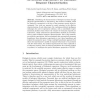Free Online Productivity Tools
i2Speak
i2Symbol
i2OCR
iTex2Img
iWeb2Print
iWeb2Shot
i2Type
iPdf2Split
iPdf2Merge
i2Bopomofo
i2Arabic
i2Style
i2Image
i2PDF
iLatex2Rtf
Sci2ools
125
click to vote
DIS
2010
Springer
2010
Springer
An Artificial Experimenter for Enzymatic Response Characterisation
Identifying the characteristics of biological systems through physical experimentation, is restricted by the resources available, which are limited in comparison to the size of the parameter spaces being investigated. New tools are required to assist scientists in the effective characterisation of such behaviours. By combining artificial intelligence techniques for active experiment selection, with a microfluidic experimentation platform that reduces the volumes of reactants required per experiment, a fully autonomous experimentation machine is in development to assist biological response characterisation. Part of this machine, an artificial experimenter, has been designed that automatically proposes hypotheses, then determines experiments to test those hypotheses and explore the parameter space. Using a multiple hypotheses approach that allows for representative models of response behaviours to be produced with few observations, the artificial experimenter has been employed in a labor...
Artificial Intelligence Techniques | Biological Response Characterisation | DIS 2010 | Hypotheses | Theoretical Computer Science |
| Added | 10 Feb 2011 |
| Updated | 10 Feb 2011 |
| Type | Journal |
| Year | 2010 |
| Where | DIS |
| Authors | Chris Lovell, Gareth Jones, Steve R. Gunn, Klaus-Peter Zauner |
Comments (0)

